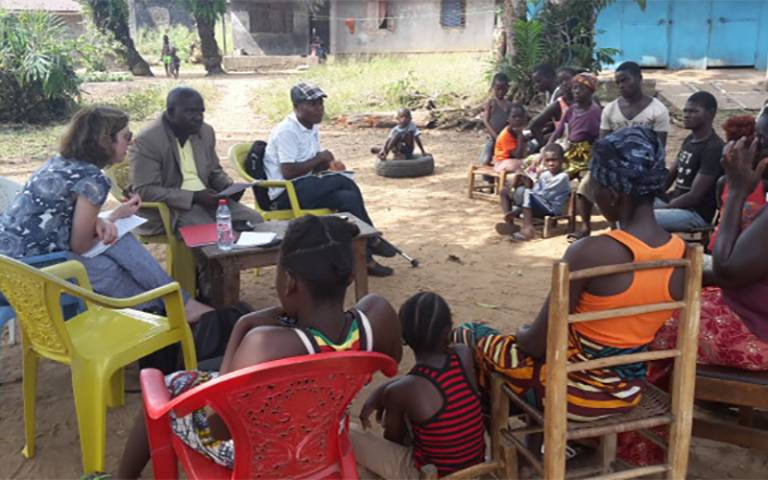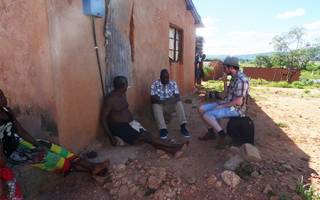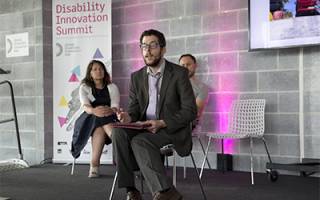UCL and Leonard Cheshire Disability: building the evidence base for equal rights globally
26 September 2017
This innovative partnership between Leonard Cheshire Disability and UCL works to address global challenges and increase worldwide engagement around disability.

The Leonard Cheshire Disability and Inclusive Development Centre has been working collaboratively for more than two decades to address global challenges and increase worldwide engagement around disability.
An innovative partnership between Leonard Cheshire Disability - one of the UK’s largest disability charities - and UCL, the Centre works through a range of research programmes in countries across the world to deliver effective, inclusive solutions for all.
The centre is staffed by a small group of academics from multidisciplinary backgrounds connected by their passion for disability and international development.
A multidisciplinary approach
Director Professor Nora Groce is a leading expert on global health and international development, while Dr Maria Kett, Assistant Director and an anthropologist, brings a wealth of experience in conflict and post-conflict settings.
Supporting Prof Groce and Dr Kett are Dr Ray Lang, a policy expert, Marcella Deluca, an inclusive education specialist, Dr Mark Carew, a social psychologist, and Emma Bird, project co-ordinator for the Centre’s Washington Group grant.
Prof Groce, who co-chairs UCL’s Grand Challenge of Global Health Working Group, said: “Disability issues and research are gaining increasing prominence across UCL. The biggest challenge facing disabled people today is dealing with poverty. Over the years, the focus on disability has shifted from being a medical issue to more of a social one.
“UCL’s Leonard Cheshire Disability and Inclusive Development Centre is one of few centres in the world that specialises in applied research. We look at what we can do as researchers to have immediate or long-term benefit. Partnership is a really important aspect of how we work.”
‘Bridging the Gap’

The project examines the extent to which there is a ‘disability and development gap’, hypothesising that, as development progresses within low-income countries, disabled people are left behind on many key indicators such as education and employment in comparison to their fellow non-disabled citizens.
Another ESRC-funded project examined the political and institutional conditions for effective poverty reduction for people with disabilities in Liberia. Researchers examined poverty and subjective well-being experienced by people with disabilities and compared these with non-disabled people, both within the same household and in the wider community.
The research analysed national policies to better understand how legislation impacts persons’ with disabilities, and the results are now providing an evidence base for in-country decision making including a new National Human Rights Action Plan and National Disability Action Plan.
Inclusive education
In Kenya, the team undertook research around girls’ education, funded by the DFID Girls’ Education Challenge Fund. This project addressed the physical, cultural and social barriers to education for girls with disabilities and enabled 2,050 disabled girls in 50 primary schools in the region to receive a full, quality and inclusive primary education.
Research activities included a pre- and post-intervention survey on teachers’ knowledge, attitudes and practices related to disability and inclusive education; a cohort study of out of school girls with disabilities; and a qualitative study on the role of male caregivers/mentors within the girls’ education.
The centre is also undertaking research on Disability and Climate Resilience, funded by DFID. This aims to increase the understanding of the links between disability and climate resilience and to improve the delivery of policy and programme work.
The research is being undertaken in Kenya and Bangladesh, both countries which face development challenges, including diverse environmental hazards associated with the impacts of climate change.
Global reach

Developed with funding from the Australian Government, the training has been delivered in five regions so far including the Caribbean and Central and South America.
The centre is also a founding member of the Global Disability Innovation Hub (GDI Hub). This autumn, the GDI Hub and the International Committee of the Red Cross will co-create pioneering new products and services for people with disabilities.
Exploring accessibility and employability in conflict and post-conflict situations, the Enable Makeathon 2.0 will crowd source challenges and solutions to bring together disability, innovation, entrepreneurship and technology. Concurrent events will take place in London – at the heart of the Global Disability Innovation Hub at Here East - and Bangalore, India.
The Enable Makeathon 2.0 follows on from the successful Disability Innovation Summit 2017 at Here East in July, which brought together disabled people, academics, practitioners, international partners, organisations and innovators to shape the future of disability.
 Close
Close

